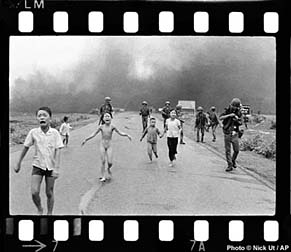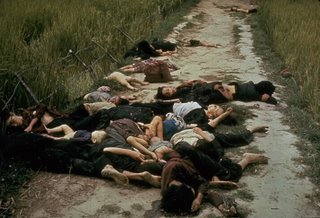It's Not About What You "Believe" To Be True
One form of argument that is very prevalent today and displays a fundamental disregard for research and for history is the one that goes like this: “Because I don’t believe it, it is not true.” You see this trope in the political arena as well as prevalent among political blogs. Today, for example, after the report that the missing GIs in Iraq had been tortured before they were killed, a right wing blogger wrote that he didn’t believe “Kerry's absurd assertion that American soldiers ‘terroriz[e] kids and children’,” or Jane Fonda’s assertion that “US troops have been trained to commit atrocities against innocent civilians.” Not that anything could justify this type of brutality against our soldiers (remembering, please, that I served overseas in the U.S. Army from 1970- through 1972), it is interesting to dissect the blogger’s ability to understand the truth.
 This ability to discern “the truth,” comes, of course, only from research. The truth is not something you “believe in,” but rather something you have documented and analyzed through careful research. For instance, as to Kerry’s claim, just look at these images: the image to the left is the world-famous shot of a young girl fleeing a Vietnamese village that has just been napalmed by US forces. The image above is of the equally notorious My Lai massacre. Surely these children are “innocent” in all regards. Are you not glad they are not your children? Think about that. And for those who are skeptical about the Internet – just travel to the National Archives in
This ability to discern “the truth,” comes, of course, only from research. The truth is not something you “believe in,” but rather something you have documented and analyzed through careful research. For instance, as to Kerry’s claim, just look at these images: the image to the left is the world-famous shot of a young girl fleeing a Vietnamese village that has just been napalmed by US forces. The image above is of the equally notorious My Lai massacre. Surely these children are “innocent” in all regards. Are you not glad they are not your children? Think about that. And for those who are skeptical about the Internet – just travel to the National Archives in
And Jane Fonda’s assertion, as ill-timed as it was, is, unfortunately an historical fact dating from the days of George Armstrong Custer. Countless readily available diaries of soldiers, not to mention press editorials, document in grave detail the utter disregard for the live of women and children as US soldiers fought battles against indigenous populations from
The point of my own argument here is not to disparage our own troops –I learned in Basic Training at Ft. Bragg, NC, in the hot and historical summer of 1969, that war is a nasty business and the goal, as in pro-football, is to survive and win at any cost. However, unless we are able to face our own reality, to learn the lessons of our own history, today’s so-called “War on Terrorism” is doomed to fail.
The rest of the world, in today’s new nuclear age with N. Korea and



8 Comments:
I agree with many of your observations. Too often opinions from all parts of the political spectrum are divorced from legitimate research and analysis. Recently, I have been delighted with the analysis of research presented in one of Berkeley's open-source course, Foriegn Policy after 9/11. This title of this course is a slight misnomer, however. Because one the more tenacious misunderstandings of popular post-9/11 debate is the obsession with the actual attack, which bears little on the current political situation.
The Southeast Asian War of the mid-20th Century was a war by proxy of the three superpowers of the day: the Soviet Union, China, and the United States. The Soviet Union supported the North Vietnamese. China supported the Khmer Rouge. The United States supported and fought along beside the South Vietnamese.
While it is very regretable that the people of southeast Asia got caught up in a war that was not their own, did the refugees of that war choose to relocate to the Soviet Union, China or the United States?
Professor Weller, if you had to choose a side would choose the Stalinists, the Maoists, or the Great Society of Lyndon Baines Johnson?
Actually Hugh, it is quite a bit more complicated than that. And you gave me the classic either/or choice, which I reject!
There were other solutions.
I didnt know where to respond to the comment you posted on my blog but I just wanted to tell you that I actually just got that picture from yahoo images and typing in something like "good blogs" .. I thought it was a perfect picture to post on my blog! =)
Did you notice in that My Lai Massacre - Vietnam, March 16, 1968
picture there is a baby in the very middle with its behind upward.. how sad.. What army did you serve in during the 1970s?
I have several Khmer friends from Kampuchea Krom that fought along with the US against the Stalinists in Vietnam. In fact, the Khmer people of South Vietnam suffer oppression to this day for being anti-communist.
All Cambodians suffered atrocities at the hands of the Chinese supported Khmer Rouge. It is estimated that 1.7 million people of a Cambodian population of 7 million were slaughtered as the Maoist supported Pol Pot attempted to return his country to "Year Zero".
Every Cambodian that I know has a personal horror story that can be directly attributed to Marxists.
Yes - and if we hadn't been busy bombing Cambodia (and Laos) secretly (except to the citizens of those countries) and illegally, the legitimate government might never have been destabilized to the point that the murderous Khmer Rouge would have gained popular power. That, not to mention the deaths of 57,000 American soldiers and countless Vietnamese on both sides of the 17th parallel, was just one of the many unintended consequences of the Allies’ meddling in SE Asia in the aftermath of WWII.
As I said, the situation is complex and looking at the history from more than one viewpoint paints a more revealing picture, which is an important lesson that as we can see from the present situation in Iraq has gone unheeded, once again. The insurgency is an unintended but very predictable consequence of a foreign policy based foremost on force and not diplomacy. Even if force were the only solution, even if WMD were there, the policy ignored historical realities that could have been examined and adjusted to. That’s why an honest attempt at research and looking carefully at multiple viewpoints and drawing conclusions and making plans based on the best evidence is so important.
Labeling groups as “Marxist” and “Stalinist” is a form of argument that uses pejorative terms to frame the argument in one’s favor, without having to address the complexities of the historical forces at issue. For example, how might the so-called Marxist Sandinistas evolved if they hadn’t had to contend with Reagan’s Contra War. I have my own ideas about that, because I was there then and have been back several times since: what I do know is the country has dropped once again into the pit of poverty and illiteracy that the Sandinistas were successful, albeit momentarily, in bringing their people out of. Dismissing the Sandinistas as “Marxists,” as the popular press likes to do, really is not an argument, just as calling the NVA “Stalinists” sheds no light on the issues.
Professor Weller,
I agree with your point about the insurgency. While there are different, complex categories of of terrorists and terrorists-as-insurgents. Imperial foriegn occupation predictably leads to specific terrorist/insurgent tactics, including civilian and suicide killings. So regardless of how a person feels politically or morally about the Iraq occupation, one also needs to appreciate the negative causations.
Post a Comment
<< Home